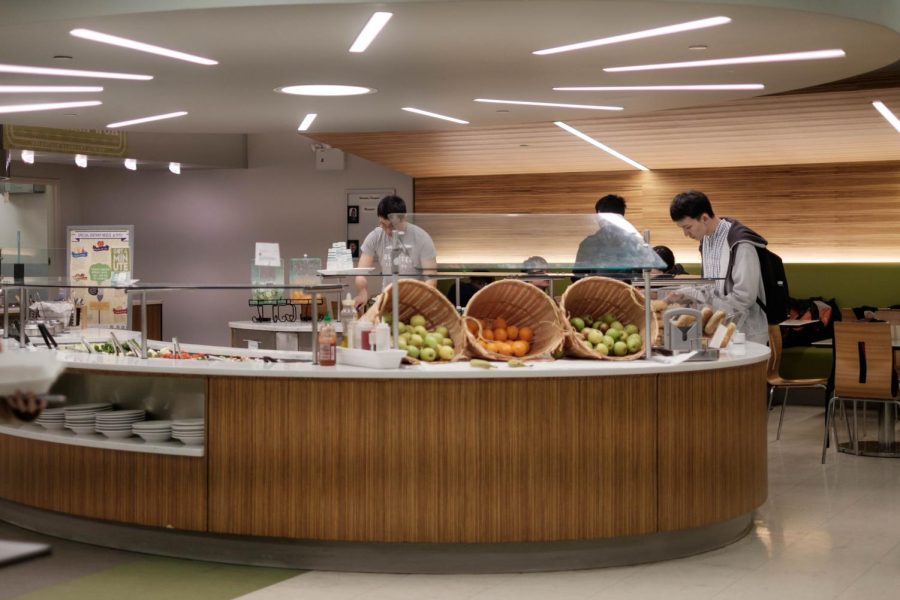NYU Presents Timeline for Evaluating Potential Aramark Replacements
Downstein Dining Hall, home to ’90s and early 2000’s throwback songs. (Photo by Echo Chen)
March 28, 2018
Following months of controversy surrounding Aramark, NYU’s food service provider, the Dining Advisory Committee — which includes students, university administration and Aramark representatives — held a meeting on March 27 to discuss potentially changing food service providers within the next calendar year.
Twenty three students attended the meeting on the ninth floor of the Kimmel Center for University Life — the largest group ever to comprise the committee. The meeting was led by Senior Director of Campus Services Michael O’Brien.
On the heels of Downstein’s Black History Month controversy, Lipton Dining Hall’s health inspection failure and a slew of ethical issues Aramark faces as a company, students put administrators in the hot seat regarding NYU’s future with the food service provider.
NYU’s contract with Aramark is up for bid in August 2018, and processes for evaluating candidates are beginning now, according to Owen Moore, assistant vice president for Campus Services at NYU. While administration is not sure Aramark will be replaced, Moore said there are three other major service providers that are being considered — Sodexo, Compass Group and ADI.
Between now and June 1, administration will form a committee managed by representatives from NYU Dining Services, Campus Services, Procurement and Kimmel Operations to evaluate the bidders and advise President Andrew Hamilton on the direction NYU Dining should take. The committee will also include a dining consultant, who will be hired on April 1.
Members of certain student groups, such as Inter-Residence Hall Council, Student Senators Council and the Resident Assistant Council will also be included on an evaluation committee.
The various providers will be evaluated over the next few months; two finalists will have an open town hall in Spring 2019. In the weeks following the public meeting, Hamilton will make a final decision and contract negotiations will begin. According to Moore, the next dining contract NYU enters into will last five years.
If a new provider beats out Aramark for the job, it will take over NYU Dining during Summer 2019.
Joseph Taecker-Wyss, a Gallatin junior and a member of the Incarceration for Education Coalition, brought up the various problems with many of the large food service providers on the administration’s shortlist. He proposed NYU stay away from food service providers entirely — a model that the University of California, Los Angeles and Yale University have followed.
“When you look at Aramark as a company, it’s doing a truly horrific job,” Taecker-Wyss said. “It’s the largest food service provider for prisons. This company is deeply invested in profiting off of black and brown lives. NYU can claim to be a progressive, diverse community, but when it’s paying corporations that are invested in these horrible issues, it shows otherwise.”
Moore briefly addressed IEC’s concern that companies like Aramark and Sodexo profit from mass incarceration.
“We are asking every potential bidder what their relationship is with corrections, justice or incarceration dining programs,” he said. “We want full disclosure there.”
Moore also said that an independent NYU Dining Service is not on the table, as the university is too large and widespread.
“We have 350 Aramark employees,” he said. “We have losses of jobs that have to be taken into consideration.”
Students on the committee also expressed discontent with the lack of transparency within NYU Dining, specifically with its sustainability efforts.
“The transparency we’ll just have to work through,” Campus Executive Chef Mike Wilson said. “We give all our information to the Office of Sustainability.”
Also represented at the committee meeting were several members from Student Labor Action Movement and NYU Divest, who took a break from their occupation of the Bonomi Admission Center to support IEC’s effort to cut ties with Aramark.
“I feel like it is democratizing by virtue of increasing student participation,” said Lola Jusidman, a GSAS graduate student and member of NYU Divest. “I think that clearly NYU Dining has made a lot of efforts to improve its service to students. This process seems quite fair and inclusive. SLAM and Divest would also be interesting in making sure the new contractor has fair labor standards, especially for farm workers.”
Other student concerns and ideas were also discussed at the committee meeting, such as menu changes and adding more restaurant franchises to NYU Dining. Aramark representatives avoided addressing controversy over the Downstein Black History Month menu, directing students to provide feedback on the Fall 2018 Dining Survey.
“I really hope they follow through with getting students involved in this process,” Taecker-Wyss. “To me, we’re at a really critical turning point. Success is NYU not using a dining provider that’s for mass incarceration, and failure is anything else.”
Email Sakshi Venkatraman at [email protected].


























































































































































Joe Insider • Apr 24, 2018 at 2:58 pm
NYU should secure guarantees of resources from Aramark if they are to retain NYU as the service provider. Aramark’s health and wellness initiatives as well as sustainability programs are much better than what their competitors can provide. NYU’s expertise is not (and should not be) dining. However, at the same time Aramark’s CEO, an ex-Pepsi employee has been gutting the company’s business by firing people, cost cutting and centralizing. They talk about innovation and they hardly innovate. The insiders tell me, he allocated University resources into the center where they do not contribute to the University business where the resources are needed. So, NYU has to ask for things like:
– How is your residency programs better than Chartwells or Sodexo
– Who are the sustainability leaders in the company and how have they improved Aramark. Who are the sustainability leaders who support Universities
– What has been your innovation in the university space??